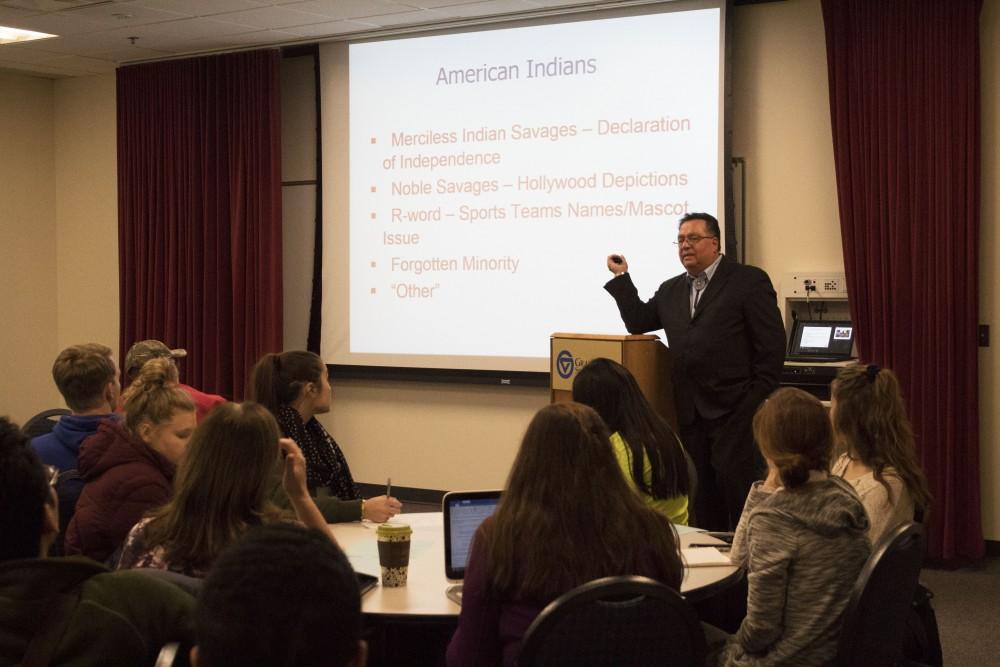Native American writer discusses Standing Rock at GVSU

GVL / Hannah Hill Levi Rickert (Potawatomi) founder of Native News Online shares his insights on Standing Rock, Tuesday, November 14, 2017.
Nov 16, 2017
In 2016, protests against the Dakota Access Pipeline (DAPL) at Standing Rock drew the largest gathering of Native Americans this century.
On Tuesday, Nov. 14, Levi Rickert (Prairie Band Potawatomi Nation), founder of Native News Online, spoke on the matter at Grand Valley State University for the Office of Multicultural Affairs’ Native American Heritage Month.
Rickert shared the personal experience of a Native American journalist active in the resistance of the pipeline construction.
“In Standing Rock, there is a big lesson in there for all of us, not just for Native people,” he said.
Rickert explained how Standing Rock represented the unending fight of Native Americans protecting their nations against actions of the U.S. government.
“As Americans, we have got to recognize what is going on in this country now,” he said. “As students, as you study what is going on in this country and you look at Standing Rock, sometimes resistance is proper.”
Rickert said Standing Rock resembled a fulfillment of a prophecy and the rise of the “seventh generation” as the Native youth took initiative to lead the resistance.
“I hope that as young people, as the Standing Rock youth taught us, young people make a difference,” he said.
As part of his discussion, Rickert spoke about ways in which all youth—not just Natives—need to be vigilant and understand what is going on around them. Rickert thinks resistance is even necessary in some situations.
“If resistance is necessary, do it in a nice way,” Rickert said. “I concur, 100 percent, it should be done in a peaceful, prayerful way and always legally.”
People resisting at Standing Rock mostly remained peaceful throughout their resistance, despite forceful opposition from governmental officials. Rickert showed photos of dogs released and water hoses sprayed at protesters.
“They had weapons, we had prayer,” Rickert said.
Rickert noted the way in which average citizens cannot always rely on the mass media to relate what is going on across the country.
“People really need to evaluate what the government officials are saying, or (what) news media is saying, and find out what the facts are behind it because so often we find ourselves in trouble,” he said. “We really need to find out the facts. It’s so important. It’s our livelihood.
“It’s our fact of life.”
Tonisha Begay, program assistant for the Office of Multicultural Affairs, noted that since Rickert participated in the protests at Standing Rock, he offered a critical perspective of someone personally affected and present at the scene. Begay is also the staff adviser for the Native American Student Association and a member of the Native American Advisory board at GVSU.
“I think (Rickert’s lecture is) really helpful for people who weren’t following as the story broke out and even for people who were following,” Begay said. “It depends on your news source, and it depends on who is telling the story. Perspective matters. Some sources will tell different things, or they won’t tell the whole story, or they’ll tell only part of it.
“So, I think it is really good to hear somebody’s perspective as somebody who is a journalist. And he can think critically and is also invested in this.”
Despite the resistance of thousands of Native Americans and non-Natives, the construction of the pipeline continued, but Rickert noted the continuation of resistance as people remain attentive.
“As I saw the Native youth, people were really conscientious of the fact that things are happening within resistance, and we can try to make a difference,” Rickert said.
Standing Rock brought thousands of Natives together and provided energy for the continued fight, Begay said.
“A lot of Natives learned at Standing Rock how to resist and that they could resist,” Begay said. “So, there is a lot of hope in that.”
Begay said it is important for non-Natives to educate themselves on the matter and help with the resistance.
“Learning and listening and coming to events like (Rickert’s lecture) can be intimidating; it can seem overwhelming,” Begay said. “Always being aware and always listening, always sharing news, even on social media, I think that helps because we can’t get to everybody.
“But if students raise awareness, I think that is going to get us in more places.”






















